- Home
- Priscilla Royal
Valley of Dry Bones mm-7 Page 14
Valley of Dry Bones mm-7 Read online
Page 14
Andrew nodded.
“Then you will retreat to a small cell, which I will order readied for you, and that door shall be locked. Entrance will be permitted only to the lay brother I assign who will bring food and tend to your needs. Should you wish to speak with me, send that brother with the request for an audience. When I have decided on your penance, I shall order you brought to my chambers, again by that one lay brother alone.”
Andrew knelt and begged her blessing.
As she watched him leave, she wondered if she truly believed him. Her heart cried out that he was an honorable man and demanded her mind agree. Indeed, she hoped he was innocent. She also knew he must remain in that solitary cell until this murder was resolved.
It was always possible the killer might strike again, and, if he did, there must be no doubt of her prior’s innocence. Now she must decide how much, if anything, to tell Crowner Ralf.
Gesturing to Gytha, she asked her to send for Brother Beorn. Of all the lay brothers in the priory, he was the one she trusted most. Although he was deeply troubled by the quarrel he had witnessed between his religious superior and Baron Otes, he would never treat the prior with discourtesy. Seeing Andrew locked in that windowless room as hard penance for giving in to the sin of wrath, Beorn would honor the prior even more.
As her maid rushed in obedience from the chambers, Eleanor walked to the window and stared out at the priory walls. They shimmered in the heat as if they had been crafted, not of stone but of some flimsy cloth that now twisted in the slight breeze. Even these works, so enduring to men’s eyes and meant to house God’s servants, may prove impermanent, she thought.
Sighing, she shut her eyes and forced her mind to return to the problems at hand. If only Brother Thomas had not left Tyndal to become a hermit, then he might have become that monk chosen by Andrew to act as temporary prior. Her sinful longings aside, she had learned to value his insight, and, for reasons God would surely condone, she deeply missed his company.
Chapter Twenty-five
Gytha tilted the jug and poured ale into round pottery cups.
Reaching for a ruddy apple from the platter, the crowner smiled with gratitude, his face red and sweating from the heat.
“What have you discovered about the killer?” Eleanor leaned back in her chair. Her voice was soft with hope.
“Nothing that would give a name to the man, although I think some possibilities may be discounted. I went first to Signy who said the inn housed the usual ardent pilgrims and assorted traveling merchants. Apparently they were a weary bunch and found their beds too early for any to be guilty of a quick murder after supper.”
“For that, we must give thanks.” Despite her worries, the prioress laughed at his phrasing and with some relief that Signy was willing to break her long silence with Ralf. Although Eleanor suspected their conversation had been awkward, she was pleased their festering quarrel showed signs of healing, even if it had taken another murder to bring that about.
“As for those village men most likely to make trouble, none are known for any greater violence than a fist fight after too much drink.” Indicating he had several points to make, the crowner raised one finger. “The baron had not been here long enough to seduce a local woman into his bed so it is doubtful he was killed by a jealous husband or love-struck lad.” He extended his ring finger. “Nor do I suspect that robbery was the intent. A bag of coin was attached to the corpse, and there were enough jeweled rings on the fingers to tempt most men of any rank.” He waved three of his own, which, in contrast, were quite unadorned.
Stopping for a moment, Ralf thoughtfully stared at his fourth finger. “Oh, some mutterings about outlaws have been heard. That rumor I mistrust. If there are any such men in the area, they have managed to hide themselves well enough not to be seen before now. Why would they chance discovery by committing random murder without any gain at all?” He studied his thumb which remained folded into his palm.
“I have heard nothing on market day about real sightings or persistent rumors of lawless men, my lady.” Gytha added bread and cheese to the offered food on the platter near the crowner’s elbow. “At least not since the last snows melted.”
“Although the idea is troubling for many reasons, we cannot ignore the possibility that the killer might be a member of the queen’s party.” Eleanor hesitated before adding, “What of the men who accompanied the courtiers on this journey?”
“According to Signy, they spent their evening gambling. To the best of her knowledge, no one left the inn.”
Gytha frowned. “Signy could not watch everyone. Did any of those who serve food and drink notice…?”
“She asked them and later told me no one saw any of the men slipping away.”
“Daylight lasts so long in this season that many seek bed before dusk. Signy and those serving at the inn must take time to rest. A man could leave and not be noticed, either during the busy time or after dark.” Suddenly realizing she had been adding to a discussion she was supposed to ignore, Gytha turned red. “Forgive my intrusion, my lady!”
“You have just reminded me that we cannot dismiss the idea that anyone at the inn, whether he sought a bed early or not, might have left to meet the baron after dark.” The prioress gestured permission for the maid to join in the conversation, then turned back to Ralf. “From what you have learned, this does not look like a random killing. Nothing was stolen, and no one has seen any brigands. I am unhappy we cannot rule out the possibility that some alleged pilgrim or merchant, staying at the inn, had a motive for killing, or that one of the escort might have had equal grounds for committing violence against the baron.”
“I concur, but the pilgrims and merchants staying that night have since journeyed on. I fear we have no way of discovering which amongst them might have known the dead man.” He tore off a large piece of bread, added cheese, and bit into it with marked pleasure.
“Most unfortunate. However, we might comfort ourselves by answering a question. How probable it is that an enemy of Baron Otes, disguised as pilgrim or merchant, would travel the far distance from court so that he might kill the baron on the banks of our particular stream?”
Ralf nodded.
“I am more inclined to suspect that something happened, either shortly before the party’s arrival or just after, to rouse some member of the queen’s party to commit murder. What is your thinking? Is it likely that a stranger would lodge at the inn, wait for the baron to arrive, and then ride off after killing him?”
“Your conclusion has merit,” the crowner replied. “The route and length of the journey would give anyone many opportunities to kill and safely escape. The murderer did not have to wait until reaching Tyndal to do so.” Ralf failed to add that it was Father Eliduc who had brought this to his attention earlier.
“As far as the escort is concerned, surely your brother would know all the men well enough. Have you asked Sir Fulke if any of them, or their families, had a dispute with Baron Otes?”
The crowner picked up his mazer, only to find it empty. He blinked.
“I will add water to the ale, should you want more.” Gytha gave Ralf a mischievous grin before refilling his cup.
He muttered something incomprehensible and handed her the mazer.
Eleanor raised an eyebrow, sensing something between crowner and maid she had not noticed before. Although Gytha had often teased the crowner over the years, this instance had a different tone. Surely Ralf would never hurt Tostig’s younger sister, and she knew the crowner to be honorable. She was probably imagining things, and, if not, Tostig would swiftly handle any problem.
Ralf cleared his throat, his expression suggesting discomfort at the prioress’ steady gaze.
Eleanor’s thoughts shifted back to murder. “I am sure you must have considered that question.”
“I did ask the sheriff about the men,” the crowner said. “Many at court have reason enough to despise the baron, but the guards were all too poor and too low in station to fal
l within his avaricious notice. The same was true of their kinsmen. The baron has long preferred to pursue the greater gain from the more prosperous ranks.”
Eleanor sipped her ale thoughtfully. The dead man had chosen to torment Prior Andrew, a man who also could be thought beneath notice.
“One of the guards might have been hired by another who remains at court.” Gytha lowered her eyes after glancing at her mistress.
“An observation worthy of careful consideration,” the prioress replied, resting her chin on her hand.
“I did learn something else when I talked to Signy.” Ralf tilted his head in the direction of the inn. “Nute was hiding in the bushes near Brother Thomas’ hermitage the night of the murder and saw two men arguing near the stream.”
Eleanor leaned forward. “Why did you not mention this before?”
“Because the lad recognized neither of them. When I asked for details, all he could say was that one was fat and the other not.” The crowner shrugged.
Gytha looked relieved. “They were not local men if he could not identify either.”
Eleanor wondered if local included the priory. Had Gytha heard about the quarrel between Otes and Andrew? Although Brother Beorn was not one to gossip, she did not know if anyone else had witnessed the argument and failed to tell her, choosing to whisper the news about instead. Must she seek out these witnesses, question them, and demand prudence in their speech until this murder could be solved? The Prioress of Tyndal was not pleased with the possibility.
“More likely he could not see them well enough,” Ralf said.
Gytha shook her head. “If he was able to determine that one was larger than the other, he might have been able to see enough to judge if they were from the village.”
“Did he hear any of the argument?” Although Eleanor knew a child’s word would have little weight against that of a man, she hoped Nute’s story might at least help them find the killer. Getting the murderer to confess was a problem to worry about after capture.
Ralf thought for a moment. “He did say that the fat one, presumably the baron, asked the other where the man was that they were supposed to meet. An instant before the baron was killed, Nute did hear him exclaim ‘Impossible’.”
“Right away, as if there were a connection between word and deed?”
“I fear I did not pursue details. Signy thought Nute had endured enough questioning from me, and the boy was getting restless.”
The prioress nodded. Considering the baron’s reputation for greed, there was nothing surprising about the killer successfully luring him away from Tyndal with some promise of gain. The details of that bait might not be especially important, but she did wonder if there was any significance in the word uttered by Otes just before he was killed. Was it important that Nute remembered only that and nothing else? Or was it the only word spoken loud enough for him to hear?
“Is Nute still too frightened to give further details?” Eleanor hoped there might be far more to learn.
“Signy promised to draw them out, should the lad seem willing to talk more.” Taking another large chunk of cheese from the platter, the crowner bit off a mouthful and chewed with the contentment reminiscent of some benign bull.
Eleanor decided she was exaggerating the importance of the coincidence between word and act. And, if there was more to learn from Nute, Signy would gently pursue the questioning, telling Ralf the result if there was anything of note.
As the crowner ate, she debated whether she should share one particular confidence with him. If she did, she was in danger of implicating Father Eliduc. If she did not, she might permit someone of secular rank to be ignored. Surely Ralf would honor the right of the Church to deal with him if the evidence did lead to the priest. She did not want a man subject to the king’s law to escape justice.
When Baron Otes suggested a high ranking churchman was interested in the land grant, he might have lied. By suggesting this, his intent may have been to provoke in her an ambition to improve the wealth of her priory over that of others, a ploy that almost succeeded. If he had lied, the person hoping for this gift might be a man with a secular title. As long as Otes accomplished whatever he wanted, truthfulness did not matter. When it came to the question of murder, truth did.
“An odd thing happened just before the baron died,” she said. “I am not sure if it has any relevance, but you should know of it.”
His mouth too full to speak, Ralf nodded.
“Baron Otes came to me with an offer of land. He had some benefit to himself in mind, a price I did not wish to pay. He claimed the land was valuable. I did wonder if he had made the same offer elsewhere.”
The crowner looked puzzled. “What did he want in exchange?”
“Unless it becomes necessary, I would rather not explain beyond saying he wanted reprisal against one for whom he felt some hatred.”
“My lady, you must know I now suspect that man is one of your religious. Will you tell me if he had cause to kill the baron?”
“I believe the person to be innocent of any such crime, and I must be the arbiter here in Tyndal, as you well know.” She softened her words with a smile. “Ralf, I would not let you continue hunting a killer if I thought I had the perpetrator under my rule.”
Although he looked unhappy, he nodded agreement.
Eleanor was relieved. Not only had he respected her judgement on the matter, he had proven he would honor the Church’s right to discipline its own wrongdoers.
“If Baron Otes tried to use that land as a bribe to someone else and failed, I have not heard any rumors. All that means nothing,” the crowner said. “I am neither at court nor privy to such matters.”
“I am aware of his reputation. He gained wealth primarily by threatening to reveal damaging secrets,” Eleanor said. “That is why I thought his desire to actually pay for retribution was unusual.”
“Perhaps he hoped to increase what he could get in return for the gift by playing one against another.” He shifted on the stool with evident impatience.
“When he said another was interested, he avoided the mention of any name,” she replied. All she wanted Ralf to do was pursue secular leads and so chose not to mention Eliduc’s interest in the gift. Nor did she say that Otes had spoken of how much he hoped to gain for his soul with the grant, hinting that the leader of a prominent abbey might have been the other party.
The crowner grunted.
“I think you have better sources than I to discover who was wealthy enough to be interested in valuable land and able to offer Baron Otes enough in return, Ralf.”
And should he find some link between Father Eliduc, or rather his liege lord, and the baron, the discovery would force kings and bishops to strive together for resolution and her own priory would remain safe from the power struggles of the mighty. The more she thought about it, the more she realized she had been very wise to refuse a gift that might well have been even more venomous than she had first believed.
His brow deeply furrowed, Ralf rose. “I will investigate further, my lady,” he muttered, then quickly bowed and raced from the chambers.
Eleanor and her maid looked at each other with mild surprise. The crowner had left with uncharacteristic abruptness, without even his usual jest to Gytha or a promise to return after he got more information.
Considering the matter with more care, the prioress realized he had grown uneasy after the mention of what Otes had offered her. Might he have kept some secrets to himself, just as she had over the matter of her prior, the priest, and that land grant?
Chapter Twenty-six
As they strolled along the path from the chapel to the guest lodging, Eliduc stole a look at the Lady Avelina. Her expression was too sad for such a bright day. Stopping, he bent over a yellow wild flower, as if admiring its simple beauty. “Do you remain troubled in spirit?”
Her hands, modestly folded against her waist, began to twist and intertwine with nervous distress. “Although I should not be, the turmoil does
continue.”
Plucking the flower out of the ground, he straightened and continued to study the delicate color in the petals. “Simon is with the local hermit.” He turned to look at her. “That he has stayed with the holy man this long, speaks well for your son. Methinks he wishes a better understanding of God’s desires. Although his longing may be recently discovered, our Lord must be pleased.”
“Is it sinful of me to doubt that my son has found a deeper faith?”
“I cannot imagine what other reason he would have to choose the hermit’s company.” Bringing the flower closer to his eyes, he touched one petal with the tip of a finger. Lacking moisture to sustain it in the heat, the flower was beginning to wilt. He frowned.
“He has always desired a warrior’s life and never shown any inclination to serve God by taking vows.”
“Saint Paul actively persecuted the faithful until he traveled the road to Damascus.”
She paled. “I do not want my son to suffer such a hard revelation! A mother’s heart never wants to see her child in pain.”
“We all come to God by differing paths. Perhaps Simon has finally set aside childish things and become a man, as that same Saint Paul once said to the Corinthians.”
Her forehead marked with anxiety, she walked on.
He tossed the flower aside and followed.
Avelina turned and waited for him to catch up. “He swears I shall never succeed in regaining his father’s lands and title.”
“Do you truly have any hope of it?” Eliduc shaded his eyes from the bright sun and looked over her shoulder to watch the lay brothers hoeing in the priory garden. From the chapel he heard the raucous banging on drums and winced, fearing it was practice for the advent of Darius the Mede in the liturgical drama. He had longed for delicately plucked harps and lightly rung finger cymbals. Subtlety was evidently beyond rustic novices, as he had dreaded from the start. He prayed he might endure this performance of Daniel.

 The Twice-Hanged Man
The Twice-Hanged Man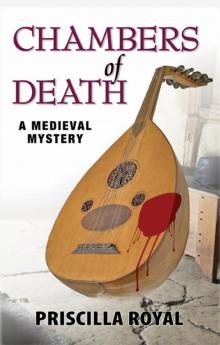 Chambers of Death mm-6
Chambers of Death mm-6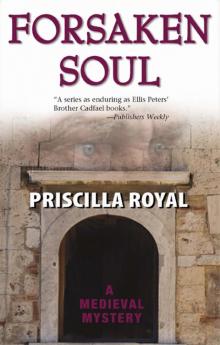 Forsaken Soul
Forsaken Soul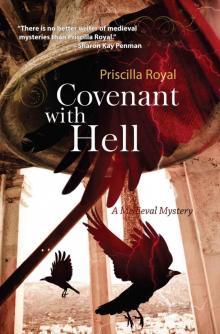 Covenant With Hell (Medieval Mysteries)
Covenant With Hell (Medieval Mysteries)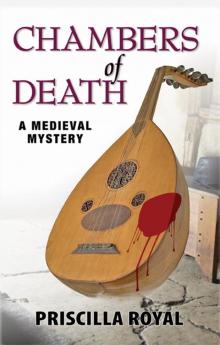 Chambers of Death
Chambers of Death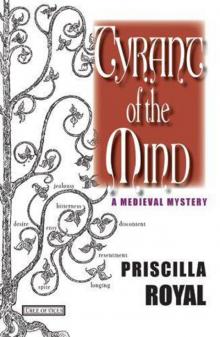 Tyrant of the Mind
Tyrant of the Mind Wild Justice
Wild Justice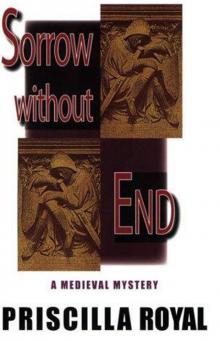 Sorrow Without End
Sorrow Without End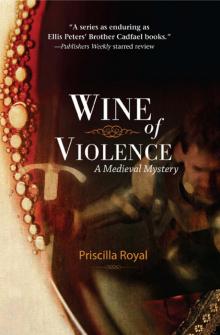 Wine of Violence
Wine of Violence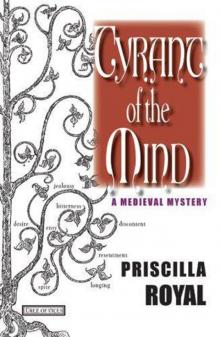 Tyrant of the Mind mm-2
Tyrant of the Mind mm-2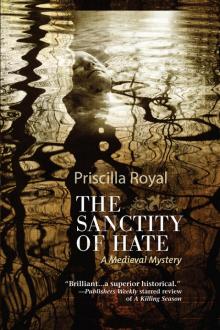 The Sanctity of Hate
The Sanctity of Hate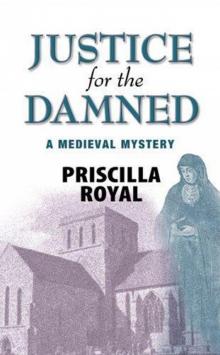 Justice for the Damned
Justice for the Damned The Proud Sinner
The Proud Sinner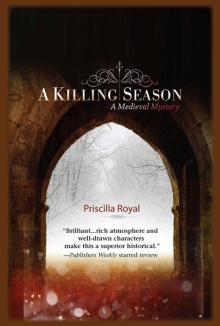 A Killing Season mm-8
A Killing Season mm-8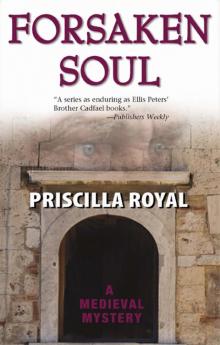 Forsaken Soul mm-5
Forsaken Soul mm-5 Valley of Dry Bones mm-7
Valley of Dry Bones mm-7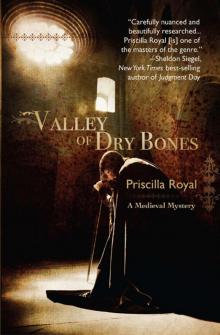 Valley of Dry Bones
Valley of Dry Bones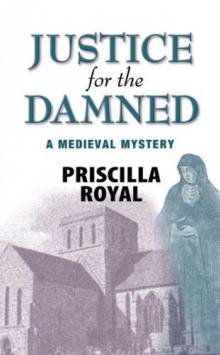 Justice for the Damned mm-4
Justice for the Damned mm-4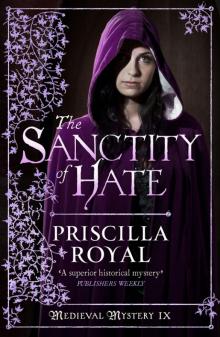 Sanctity of Hate
Sanctity of Hate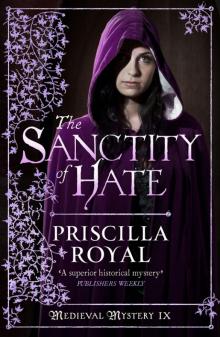 Sanctity of Hate mm-9
Sanctity of Hate mm-9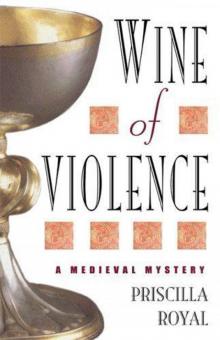 Wine of Violence mm-1
Wine of Violence mm-1